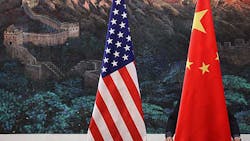US Outlines Tariffs List, China Counterpunch Hits Aircraft, Soybeans
China said it would levy an additional 25% tariff on imports of 106 U.S. products including soybeans, automobiles, chemicals and aircraft, in response to proposed American duties on its high-tech goods.
Matching the scale of proposed U.S. tariffs announced the previous day, the Ministry of Commerce in Beijing said the charges will apply to around $50 billion of U.S. imports. Officials signaled that the implementation of the proposed measures will depend on when the U.S. applies its own after a period of public consultation.
The step ratchets up tension in a brewing trade war between the world’s two largest trading nations, with the Trump administration’s latest offensive based on alleged infringements of intellectual property in China. In targeting high-tech sectors that Beijing is openly trying to promote, the U.S. has provoked furious rhetoric from Beijing and stronger threats of retaliation than many had anticipated.
"China’s response was tougher than what the market was expecting -- investors didn’t foresee the country levying additional tariffs on sensitive and important products such as soybeans and airplanes," said Gao Qi, Singapore-based strategist at Scotiabank. "Investors believe a trade war will hurt both countries and their economies eventually."
Asian stocks fell, with the MSCI Asia Pacific Index declining 0.4% to the lowest in more than seven weeks. The yen advanced.
Beijing’s proposed targets strike at the core of commercial relations between the two countries, and at some of the most politically sensitive goods in core Trump constituencies. For example, China is the world’s largest soybean importer and biggest buyer of U.S. soybeans in trade worth about $14 billion last year.
The U.S. list of planned charges on more than 1,300 product categories focused on China’s industrial machinery and technology exports. China’s envoy to the WTO, Zhang Xiangchen, called it "an intentional and gross violation of the WTO’s fundamental principles of non-discrimination and bound tariffs."
Industries including aerospace, information and communications technology, robotics and machinery were among those targeted by the USTR on Tuesday. It said it chose products to minimize the impact on the U.S. economy and consumers.
In addition to advanced technologies such as communication satellites, the U.S. list includes things ranging from various types of steel to television components, medical devices, dishwashers, snow blowers and even flame throwers.
"The U.S. list suggests that the government is targeting the ’Made in China 2025’ initiative, while China’s retaliation intends to bring Americans back to the negotiation table," said Zhou Hao, an economist at Commerzbank AG in Singapore. said in an e-mail.
What our economists say ...
"The U.S. proposal on tariffs aims to hit China’s industrial ambitions without hurting U.S. consumers," said Tom Orlik, chief Asia economist at Bloomberg Economics in Beijing. "On both objectives, it will likely fall short. In sum -- we think the macro impact will be limited and the strategic objectives difficult to achieve."
The release of the list by U.S. Trade Representative Robert Lighthizer leads into a roughly 60-day period when the public can provide feedback and the government holds hearings on the tariffs. The 25% tariffs come on top of any existing levies.
China’s Made in China 2025 plan was announced in 2015, and highlighted 10 sectors for support on the way to China becoming an advanced manufacturing power, from information technology, to robotics and aerospace. In addition, China has a separate development strategy for artificial intelligence, published in 2017.
USTR said the public can submit written comments on the tariffs until May 11, and it will hold a public hearing on them on May 15 in Washington.
"The U.S. has this vicious intention to strangle China’s high-tech innovation," said Wei Jianguo, former vice commerce minister and now an executive deputy director of the China Center for International Economic Exchanges, a government-linked think tank. "China won’t submit to the U.S. bully. Our countermeasures will hit their soft spots."
By Bloomberg News
About the Author
Bloomberg
Licensed content from Bloomberg, copyright 2016.
